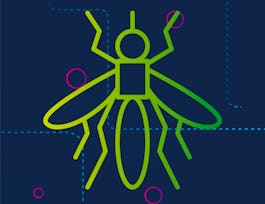The objective of this course is to introduce PyMC3 for Bayesian Modeling and Inference, The attendees will start off by learning the the basics of PyMC3 and learn how to perform scalable inference for a variety of problems. This will be the final course in a specialization of three courses .Python and Jupyter notebooks will be used throughout this course to illustrate and perform Bayesian modeling with PyMC3.. The course website is located at https://sjster.github.io/introduction_to_computational_statistics/docs/index.html. The course notebooks can be downloaded from this website by following the instructions on page https://sjster.github.io/introduction_to_computational_statistics/docs/getting_started.html.



Introduction to PyMC3 for Bayesian Modeling and Inference
This course is part of Introduction to Computational Statistics for Data Scientists Specialization

Instructor: Dr. Srijith Rajamohan
2,388 already enrolled
Included with 
(20 reviews)
Recommended experience
What you'll learn
1. The PyMC3/ArViz framework for Bayesian modeling and inference
2. Build real-world models using PyMC3 and assess the quality of your models
Skills you'll gain
Details to know

Add to your LinkedIn profile
3 assignments
See how employees at top companies are mastering in-demand skills

Build your subject-matter expertise
- Learn new concepts from industry experts
- Gain a foundational understanding of a subject or tool
- Develop job-relevant skills with hands-on projects
- Earn a shareable career certificate


Earn a career certificate
Add this credential to your LinkedIn profile, resume, or CV
Share it on social media and in your performance review

There are 4 modules in this course
This module serves as an introduction to the PyMC3 framework for probabilistic programming. It introduces some of the concepts related to modeling and the PyMC3 syntax. The visualization library ArViz, that is integrated into PyMC3, will also be introduced. The course website is https://sjster.github.io/introduction_to_computational_statistics/docs/Production/PyMC3.html. Instructions to download and run the notebooks are at https://sjster.github.io/introduction_to_computational_statistics/docs/Production/getting_started.html
What's included
12 videos3 readings1 assignment
This module will teach the basics of using PyMC3 to solve regression and classification problems using PyMC3. It will also show how to deal with outliers in your data and create hierarchical models. Finally, a case study is presented to help apply everything that was learned in Module 1 and 2. The course website ishttps://sjster.github.io/introduction_to_computational_statistics/docs/Production/PyMC3.html#linear-regression-again. Instructions to download and run the notebooks are at https://sjster.github.io/introduction_to_computational_statistics/docs/Production/getting_started.html
What's included
14 videos1 assignment
This module introduces various measures and metrics to assess the quality of the solutions inferred using PyMC3. Hands-on examples are used to illustrate how various methods and visualizations can be used in PyMC3. Finally, a brief overview of how to debug PyMC3 algorithms is provided. The course website ishttps://sjster.github.io/introduction_to_computational_statistics/docs/Production/PyMC3.html#mcmc-metrics. Instructions to download and run the notebooks are at https://sjster.github.io/introduction_to_computational_statistics/docs/Production/getting_started.html
What's included
11 videos3 readings1 assignment
This is an ungraded final project. We will utilize everything that has been learned in this course to model the disease dynamics of COVID-19 using a SIR model. Utilizing real-life data, the goal would be to infer the parameters of the SIR model for COVID-19.
What's included
1 plugin
Instructor

Offered by
Recommended if you're interested in Machine Learning

Johns Hopkins University

Imperial College London
Why people choose Coursera for their career




Learner reviews
20 reviews
- 5 stars
45%
- 4 stars
25%
- 3 stars
15%
- 2 stars
5%
- 1 star
10%
Showing 3 of 20
Reviewed on Apr 21, 2023
Good introduction to the topic. Thanks!
Reviewed on Sep 14, 2022
Great capstone providing useful practice and tools for applying the concepts.
New to Machine Learning? Start here.

Open new doors with Coursera Plus
Unlimited access to 10,000+ world-class courses, hands-on projects, and job-ready certificate programs - all included in your subscription
Advance your career with an online degree
Earn a degree from world-class universities - 100% online
Join over 3,400 global companies that choose Coursera for Business
Upskill your employees to excel in the digital economy
Frequently asked questions
Access to lectures and assignments depends on your type of enrollment. If you take a course in audit mode, you will be able to see most course materials for free. To access graded assignments and to earn a Certificate, you will need to purchase the Certificate experience, during or after your audit. If you don't see the audit option:
The course may not offer an audit option. You can try a Free Trial instead, or apply for Financial Aid.
The course may offer 'Full Course, No Certificate' instead. This option lets you see all course materials, submit required assessments, and get a final grade. This also means that you will not be able to purchase a Certificate experience.
When you enroll in the course, you get access to all of the courses in the Specialization, and you earn a certificate when you complete the work. Your electronic Certificate will be added to your Accomplishments page - from there, you can print your Certificate or add it to your LinkedIn profile. If you only want to read and view the course content, you can audit the course for free.
If you subscribed, you get a 7-day free trial during which you can cancel at no penalty. After that, we don’t give refunds, but you can cancel your subscription at any time. See our full refund policy.



